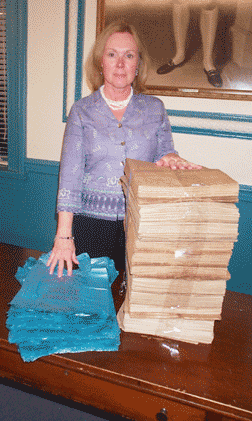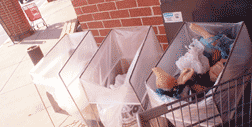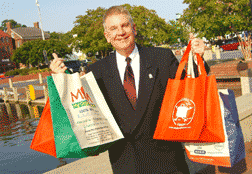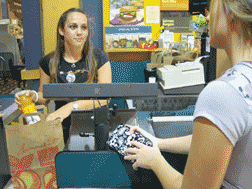 |
|||||||||||
|
|||||||||||
|
|||||||||||
|
Bag It
Will fewer plastic bags make the world more sustainable?by Carrie MadrenThe plastic checkout bag has become our standby. Stop by the grocery store, and your trip gets you your missing ingredients stocked in a tidy plastic tote. They’re comfortable and familiar. Less awkward than paper, with handles and durability. And lightweight. So lightweight, that a bag caught by a breeze — from off the back of a car, a trash can or a careless person’s hands — can travel as far as wind will take it. Breezes carry it until the polyethylene snags on a branch, gets soaked by water or mangled in weeds, becoming litter. For Annapolis Councilman Sam Shropshire, the plastic checkout bag makes for a troubled ecosystem. It’s checkout bags that he’s after — not produce bags, newspaper wrappers or other polyethylene sacks — because at checkout, shoppers have better, readily available options, he says, like 100 percent recycled paper bags and reusable cloth bags. In June, Shropshire proposed a ban to outlaw stores from giving out plastic checkout bags to customers. The ban, he claims, will help keep the plastics from blowing into streams, where they block sediment from moving and cause wildlife deaths. Plus, he says, all our plastic checkout bags require millions of barrels of oil — a non-renewable resource. His ban would be the first in the nation. San Francisco enacted a similar ban for non-biodegradable bags, but only for major chain stores. Shropshire’s bill would include any plastic checkout bag — polyethylene or biodegradable — from stores large and small, groceries, shops and restaurants. Entire nations, such as South Africa, Bangladesh and Taiwan, already ban plastic bags. The town of Modbury, England, became the first European municipality to go plastic bag-less earlier this year. Its ban has been so successful that larger English towns and cities are using it as a model. If Shropshire’s ban becomes law in Maryland’s capital, stores would have to switch to 100 percent recycled paper sacks and reusable bags — or face fines up to $500 for handing out plastic. Environmentalists have jumped on Shropshire’s ban-wagon.
“Plastic bags are a pollutant,” says Will Baker, president of Chesapeake Bay Foundation, which champions the ban. On the flip side, plastics industry representatives and grocery retailers scorn the ban as an anti-business tactic that targets a 100 percent recyclable resource. “No one should be throwing anything in the Bay, but banning bags isn’t going solve the problem,” says Donna Dempsey of Progressive Bag Alliance, which represents manufacturers of plastic bags. Bags don’t have to be one-use disposables, says Dempsey and other ban opposers. These plastics can gain new life through reuse and recycling. Choosing sides in Annapolis will be seven other council members and Mayor Ellen Moyer, known for her progressive environmental projects and policies. Annapolis could go bag-less as early as next April — if the bill passes. But would it be a win for Annapolitans? How about for the environment? Bay Weekly investigates the heated debate of the season: to ban — or not to ban. The Case Against PlasticPlastic bags draw fire from environmentalists, who say they waste energy and cause ecological problems. Nationwide, we brought goods home in some 88 billion bags in 2006, according to the Progressive Bag Alliance, which quotes the International Trade Commission. This year that number is anticipated rising to about 91 billion. Some 95 percent of those are not recycled, ending up in landfills or littering roadsides, streams and waterways. Globally, we produce some 60 billion tons of plastic — mostly for single-use production — every year. Alexandra Cousteau, granddaughter of French oceanographer and explorer Jacque Cousteau, contributed that fact to Annapolis’ July 23 public hearing on the Shropshire bill. In that 60 billion tons are some 500 billion to one trillion plastic bags, consumed worldwide each year, according to the Center for a New American Dream in Takoma Park. Cousteau, director of Earth Echo in Washington, D.C., argued that water-borne plastics affect all organisms, from plankton to sea turtles, which mistake deadly bags for tasty jellyfish. In waterways, bags fill with sediment like impromptu sand bags, washing farther downstream and clogging drains and water flow. Bags in the Chesapeake eventually wash into ocean currents. In water or on earth, plastic bags eventually photo-degrade into plastic pellets that release toxic chemicals into the aquatic environment, according to environmental scientist Kelly Davis. Entering the food chain when ingested by marine organisms, these toxins can then possibly harm human health if we eat those creatures. That’s true in the Bay and the oceans. “Oceans are downstream from us and receive all our waste,” says Cousteau. “In Belize, I saw a plastic bag from Safeway on the beach. What we inject into the ocean here will end up all over the world.” Disintegration is eventual, at best. Nobody knows how long a plastic bag will persist in the environment. The best guesses range from 500 to thousands of years. “While my research is not yet completed," says Davis, "anecdotal evidence states that a paper bag takes less than one year to decompose in the environment, whereas a plastic bag takes hundreds to thousands of years. Quite possibly, the reason for the broad range of years for plastic is that nobody has seen plastic completely decompose within their lifetime.” On land, bag litter creates enduring aesthetic nuisances. In less developed nations — where roadside cleanup crews are unimaginable luxuries — swarms of plastic bags crowd fences, catch in bushes and line roads. Such plastic accumulation spurred Tanzania — the first nation in Africa to impose a ban on all plastic bags — to make a move last year. Besides wreaking havoc as litter, the U.S.’s 100 billion plastic bags are made at the cost of some 12 million barrels of oil, according to the Organic Trade Association. San Francisco used that fact as a justification for its ban. San Francisco’s ban energized Shropshire’s crusade, which began when he visited The Gambia in Africa, an Annapolis sister city, and saw plastic piled a foot or two high on either side of the road. He then decided to do something about plastic bag litter back at home, where he noticed plenty of bags in local streams and rivers. If you’re not sold on the problem, just visit Back Creek when the tide is out, he says, and you’ll see plastic bags stuck all over the mud. “A lot of this stuff [bags and other litter] flows into the Bay, and there’s something we can do as a city,” says Shropshire, 58, who works as a fundraising consultant for non-profits. The bags get sucked into storm drains and flood out into waterways and the Bay, he said in an interview with Diane Rehm on WAMU 88.5. “Will [a city ban] cause inconvenience? Yes,” he told Bay Weekly. “But we want to live in Annapolis and its proximity to water, and we want to protect it for future generations.” Shropshire has already won wide support for his daring proposal. He’s backed by the Chesapeake Bay Foundation, the Sierra Club, the Audubon Society of Washington, the Alice Ferguson Foundation (leaders of the trash-free Potomac by 2013 initiative), Cousteau’s Earth Echo and more, who believe the best solution to our bag woes is a ban. Are they right? Planning a Plastic BanAnnapolis would be a trendsetter in the U.S., but our ban would be old news to the world. Bangladesh, Tanzania and Modbury have banned all plastic checkout bags for the same reasons as Shropshire would like to.
In Bangladesh, bags filled with sediment were blamed for exacerbating monsoon flooding in 1998. They were banned in 2002. Taiwan announced its ban in 2001, but it was met with such opposition that the sacks were legalized in 2006, though a new awareness of plastic bags’ environmental detriment has severely cut their usage. Other countries have banned only thin plastic checkout bags. In South Africa, windswept plastic bags caught on fencing and shrubbery have been jokingly dubbed the country’s national flower; thin bags were banished in 2005. Still more nations — such as Singapore, Switzerland, Germany, Kenya and Ireland — have imposed a customer tax as high as 25 cents apiece on plastic shopping bags. In Ireland, the tax has discouraged plastic sacking, reducing use by some 95 percent. Around the world, toting reusable bags is a normal practice, says Shropshire. In the U.S., when such eco-friendly shoppers tote a reusable bag to major grocery stores, they often save money. Many grocery chains offer small change discounts to customers who bring bags. Say you fill up about four grocery bags each trip and will make 50 trips to the grocery store in the coming year. At Giant, where you get three cents per bag, you’ll save six dollars. At Whole Foods, where the return is five cents per reusable bag, you’ll save $10. Stores, too, save money by not having to buy so many bags. If the ban passes, stores will add fines to their savings or costs. For the first plastic bag distribution, the fine is $100; a second offense, $200. Three or more strikes, $500. Shropshire intends to add three amendments at the bill’s September reading. First, he’s changing “recyclable paper bags” to “100 percent recycled paper bags.” If a paper bag is made of 100 percent recycled paper, no additional trees were cut down for production. Shropshire’s second amendment will specify the deadlines for compliance: six months for stores grossing more than $2.5 million a year; nine months for smaller businesses. Third, Shropshire is adding a hardship clause to allow stores to deplete their stock of plastic bags within a reasonable time limit. Whether his ban passes or not, Alderman Shropshire plans to ask Giant and Safeway — which typically default to plastic at checkouts — to start asking customers a new question: Would you like to purchase a reusable bag?
Fighting to Keep Plastic BagsPlastic bags are reusable, say bill opponents. “I’ll use a plastic bag three or four times on my boat,” says city resident Daniel Smith, who reports the last time he used paper bags, he found a large bloodstain from purchased meat on his car seat after the bag tipped. “If I didn’t have these [plastic checkout] bags, I’d be using big heavy bags,” he says, for trash and other necessary collections aboard his boat. Heavier bags don’t compact as much as the thin checkout bags and would take up more landfill space, he reasons. Just as Shropshire cites environmental reasons for prohibiting the bags, those who oppose the ban — consumers like Smith as well as retailers, restaurants and plastics companies — cite environmental reasons for maintaining status quo. Plastic is even better for the environment than paper, say bill opponents. Manufacturing plastic bags uses about three-fourths less water than making paper bags. Overall plastic bag production is also more energy efficient, requiring about one-third less energy to produce than paper bags, according to Judith Dunbar of the American Chemistry Council’s Plastics division. Two thousand plastic bags weigh 30 pounds, while the same amount of paper bags would weigh more than nine times as much, according to the Council. Paper bags are higher in volume, too. It would take seven trucks to deliver the same amount of paper as one truckload of plastic bags, Dunbar says. That’s seven times more gasoline or diesel burned, releasing seven times more pollutants into the air. That bulky paper also takes up seven time more storage space when it gets to the store or restaurant, a hardship where space is in demand, as downtown Annapolis, says Melvin Thompson of the Maryland Restaurant Association. Retailers not only save space with plastic; they also save money. Plastic bags cost a mere two to three cents apiece. Paper bags costs some six to eight cents apiece; add handles and the price rises. A plastic bag ban would increase stores’ bag expenses 600 percent, potentially costing an additional $600,000 a year, according to Jeff Zellmer of the Maryland Retailers Association. That’s the amount one Baltimore store, Santoni’s Market — about the same size as Graul’s — figured the extra paper bags would cost. Plastic bags make more sense not only for retailers but also for customers, say bill opponents. Polyethylene totes make carrying groceries home much easier, especially if the customer walked to the store. “Try walking in the rain with paper bags,” Zellmer says. “They rip.” Frozen foods turn bags into sodden spills. Customers with messy carryout food — like saucy pasta or runny soup — have extra protection with a layer of plastic between them and the food. The worst offense of all, ban opponents say, is taking away an inalienable American right. “This bill takes away our right to choose,” Greg Ten Eyck, representing Safeway, said at July’s public hearing, Recycling: New Life for an Old Bag?When we choose plastic, plastics industry supporters argue, our plastic bag begins a long, useful life — if it’s recycled. Basically, bags are made out of ethane, a gas either separated from natural gas or produced as a byproduct from refining crude oil, according to the American Chemistry Council. The energy to make the bag comes from natural gas, crude oil, hydropower or coal. Most U.S. production, including both process and raw material, depends on 75 to 80 percent natural gas, according to Chemistry Council’s Dunbar. From ethane, plastics manufacturers derive ethylene. Linking thousands of ethylene molecules creates polyethylene. Polyethylene is melted and the malleable resin blown into bag shape. Depending on how those polymers are configured, manufacturers can create different types of plastic bags. Low-density polyethylene bags — like dry cleaning bags covering clean garments — are stretchier, while high-density polyethylene, the sort used for grocery checkout bags — are crinklier. Any high- or low-density polyethylene bag labeled No. 2 or No. 4 can be recycled. After your bag carries home groceries or take-out food, you can reuse it at home or on your boat. Or it can find new life when you bring it to a recycling station, found at most local grocery stores. Stores get their plastics picked up by specialized plastic recycling centers, not at county recycling centers for glass, bottles and paper. Bags that end up in mainstream recycling must be handpicked off of a conveyor belt and trashed. When plastic bags are collected and recycled, they can be melted down to make new products, including durable lumber, signs, playground equipment and new plastic bags. Enticing stores to recycle plastic is the gleam of money. Stores cash in on your used bags by combining checkout bags with more valuable stretch wrap that binds boxes of food to delivery palates. “Between bags and the stretch film, it’s a pretty high value,” says Dunbar. A mixed bundle of bags and stretch wrap can fetch 15 cents a pound — which adds up, considering the hundreds of shipments coming into grocery stores daily. Plastic recycling companies pick up the polyethylene and haul it to a recycling center, where plastics are melted down to make new products. Giant Food in Annapolis has a contract with Virginia-based plastic recycler Trex, which makes composite decking, says Dempsey of Progressive Bag Alliance. “There’s a big market for this stuff,” she says. Between 650 and 700 million pounds of plastic film are recycled each year, according to Moore and Associates, plastic recycler in California. Stores in Maryland recycle voluntarily, but in Rhode Island, it’s mandatory for any store that distributes plastic bags to offer recycling. In other cities, like Seattle and Takoma, Washington, and San Juan, California, plastic bags are picked up at homeowners’ curbsides like glass and paper recycling. Getting a curbside recycling program “depends on the processing place, if they want to do it and market it,” says American Chemistry Council’s Dunbar. When customers bring bags back to the store, Dempsey of Progressive Bag Alliance explained, it’s a lot cleaner and more valuable. “It would have to be a conversation between the people contracted to do recycling, if they have the equipment, and the municipality to see if it would be worthwhile,” Dempsey adds. Plastic recycling seems an easy answer, except that Americans recycle only five percent of our billions of polyethylene bags each year. The downfall of plastic recycling? People don’t know — or care — about it. “Recycling bins need to be more visible with more signage,” Dempsey says. So often, recycling bins at the front of a store go unnoticed. “Some [stores] do promote it, but the majority don’t because there’s so many different manufacturers vying for space in the grocery stores.” To add interest, Dempsey’s Progressive Bag Alliance is trying to help stores amp up their plastic bag recycling or start new programs. The answer for cities like Annapolis shouldn’t be a plastic bag ban, she argues. It should be a commitment to increasing recycling. Still, our current lack of recycling leaves the other 95 percent of those more or less 100 billion U.S. bags filling landfills or littering the environment.
Litter vs. Litterers“Plastic bags don’t litter,” says Zellmer of the Maryland Retailers Association. “People litter.” Instead of forcing stores to give up the bags, he says, Annapolis should amp up citizen education and enforce existing litter laws. Downtown, Zellmer spoke with a policeman who reported that he hadn’t written a litter ticket in 10 years. Sveinn Storm, owner of Storm Brothers Ice Cream at City Dock, spoke with another officer who reported that no one had ever issued a littering citation downtown. “We urge you to enforce the laws. We can’t outlaw cars because they speed,” reasons Barry Scher of Giant Food. “This [littering] issue is a people issue.” Changing our behavior to recycle bags — keeping track of bags and not letting them loose in the environment — would take costly trash-free campaigns. Behavior does not change of itself. Getting people not to litter has been a decades-long struggle all over the world. “I don’t really know what more we could do to educate the public,” says Karen Jennings, co-chair of the Annapolis Green Party. Annapolis already has no littering signs and public trashcans throughout the city. Annapolis also spends hundreds of thousands of dollars on city cleanup. Littering — especially plastics — is a worldwide problem no one has yet solved. Life After PlasticWhole Foods Annapolis independently took the plunge to stop distributing plastic checkout bags in July, though it still offers bag recycling in a bin by the door. Under Shropshire’s bill, other stores could continue recycling bags. The councilman says his purpose is to get us to make a habit out of toting reusable bags every time we shop. To get more Annapolitans on board with using and reusing the totes, the city of Annapolis plans to distribute some 15,000 reusable bags to city residents, though details are still in the works, says city spokesman Ray Weaver. Reusable grocery bags — typically made with woven recycled polypropylene that can be machine-washed — cost about $1. Often they’re free at promotional events. Chic shoppers can order trendy shopping bags online. www.Ecobags.com offers net-like bags, organic bags with drawstrings, bags woven with hemp, canvas totes, bags in jewel-tone or pastel colors and more. www.Chicobag.com sells a large, sleek reusable bag in dozens of colors, each with its own small stuff-bag for stashing in your glovebox. European designer Anya Hindmarch’s popular limited edition I’m Not a Plastic Bag tote sold out in the U.S. and Europe, but you can find one one eBay, where starting bids range from $20 to $110. People on both sides of the plastic bag debate have considered switching from polyethylene to biodegradable bags made from sugar or corn. That’s the only plastic bag now allowed at major chains in San Francisco, for its use of renewable resources and faster breakdown in landfills or the environment. But such seemingly eco-friendly plastic bags are not the answer either side of the debate wants. “Just growing the corn and harvesting the corn for Biobags,” says the Chemistry Council’s Dunbar, uses no inconsiderable amount of energy. “There are a lot of things that people don’t think about and take into consideration. You have to look at the entire lifecycle — from growing the corn to the end of life.” Other problems crop up at the end of the non-recyclable biodegradable’s life. When biodegradable plastic bags get mixed in with other forms of recyclable plastic, they often damage plastic recycling machinery, Shropshire says. Beyond BagsThough plastic bags are so prevalent, these sacks are just one of many littered disposables. What about the polystyrene, known by the proprietary name Styrofoam, that persists along stream banks? The plastic bottles that float along shorelines? Cigarette butts that line the tideline on beaches? To tackle some of those problems, Shropshire and a handful of state legislators — including Tom Hucker and Jon Cardin — are devising a new bill for next year’s General Assembly. “It’s a more comprehensive bill that will involve other things like plastic bottles and disposable diapers,” Shropshire says. “It’s about our over-consumption.” We’ll soon hear more on that state bill. But for now, Annapolis must make a life-changing decision on bags. Whether Annapolitans believe that plastic bags are an unnecessary symbol of our disposable society or a convenience we have a right to choose, the City Council will soon decide our fate. After the final reading on October 8, the bill will go to a vote. “I feel quite confident that this bill will pass and make us the first municipality in the U.S. to ban all plastic checkout bags,” Shropshire told Bay Weekly. His legislation has attracted attention from all over the nation and the world. A Navajo reservation in the Southwest asked for a copy of the proposed bill, as did Evanston, Illinois, and both Baltimore and Washington, D.C. A representative of Mayor Adrian Fenty told Shropshire that if this bill passes in Annapolis, D.C. would attempt to pass its own. Soon we’ll find out if Annapolis will make history.
|
|||||||||||
|
|||||||||||
|
|
|||||||||||
|
© COPYRIGHT 2007 by New Bay Enterprises, Inc. All rights reserved.
|
|||||||||||





